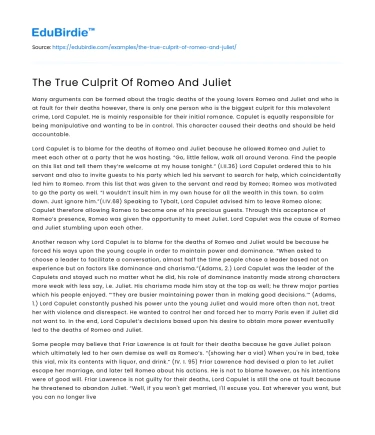Many arguments can be formed about the tragic deaths of the young lovers Romeo and Juliet and who is at fault for their deaths however, there is only one person who is the biggest culprit for this malevolent crime, Lord Capulet. He is mainly responsible for their initial romance. Capulet is equally responsible for being manipulative and wanting to be in control. This character caused their deaths and should be held accountable.
Lord Capulet is to blame for the deaths of Romeo and Juliet because he allowed Romeo and Juliet to meet each other at a party that he was hosting. “Go, little fellow, walk all around Verona. Find the people on this list and tell them they’re welcome at my house tonight.” (I.II.36) Lord Capulet ordered this to his servant and also to invite guests to his party which led his servant to search for help, which coincidentally led him to Romeo. From this list that was given to the servant and read by Romeo; Romeo was motivated to go the party as well. “I wouldn’t insult him in my own house for all the wealth in this town. So calm down. Just ignore him.”(I.IV.68) Speaking to Tybalt, Lord Capulet advised him to leave Romeo alone; Capulet therefore allowing Romeo to become one of his precious guests. Through this acceptance of Romeo’s presence, Romeo was given the opportunity to meet Juliet. Lord Capulet was the cause of Romeo and Juliet stumbling upon each other.
Save your time!
We can take care of your essay
- Proper editing and formatting
- Free revision, title page, and bibliography
- Flexible prices and money-back guarantee
Another reason why Lord Capulet is to blame for the deaths of Romeo and Juliet would be because he forced his ways upon the young couple in order to maintain power and dominance. “When asked to choose a leader to facilitate a conversation, almost half the time people chose a leader based not on experience but on factors like dominance and charisma.”(Adams, 2.) Lord Capulet was the leader of the Capulets and stayed such no matter what he did, his role of dominance instantly made strong characters more weak with less say, i.e. Juliet. His charisma made him stay at the top as well; he threw major parties which his people enjoyed. “‘They are busier maintaining power than in making good decisions.’” (Adams, 1.) Lord Capulet constantly pushed his power unto the young Juliet and would more often than not, treat her with violence and disrespect. He wanted to control her and forced her to marry Paris even if Juliet did not want to. In the end, Lord Capulet’s decisions based upon his desire to obtain more power eventually led to the deaths of Romeo and Juliet.
Some people may believe that Friar Lawrence is at fault for their deaths because he gave Juliet poison which ultimately led to her own demise as well as Romeo’s. “(showing her a vial) When you're in bed, take this vial, mix its contents with liquor, and drink.” (IV. I. 95) Friar Lawrence had devised a plan to let Juliet escape her marriage, and later tell Romeo about his actions. He is not to blame however, as his intentions were of good will. Friar Lawrence is not guilty for their deaths, Lord Capulet is still the one at fault because he threatened to abandon Juliet. “Well, if you won't get married, I'll excuse you. Eat wherever you want, but you can no longer live under my roof.” (III. V. 188) Since Juliet was given no other option besides forcibly marrying Paris, Lord Capulet is responsible for pushing Juliet to take such drastic measures. He should have listened to his daughter when she pleaded him. The demise of Romeo and Juliet is all the fault of Lord Capulet.
In the end, Lord Capulet is the most culpable character for the unfortunate suicide of both Romeo and Juliet. He was the principal reason that the couple met in the first place, as he lured Romeo and allowed Romeo to find his new found love interest. Capulet’s conniving ways to receive power and to maintain his rule also caused him to force immoral ideals unto his daughter. Lord Capulet is at fault for the death of his only daughter and her lover for the sole purpose of maintaining his status.






 Stuck on your essay?
Stuck on your essay?

